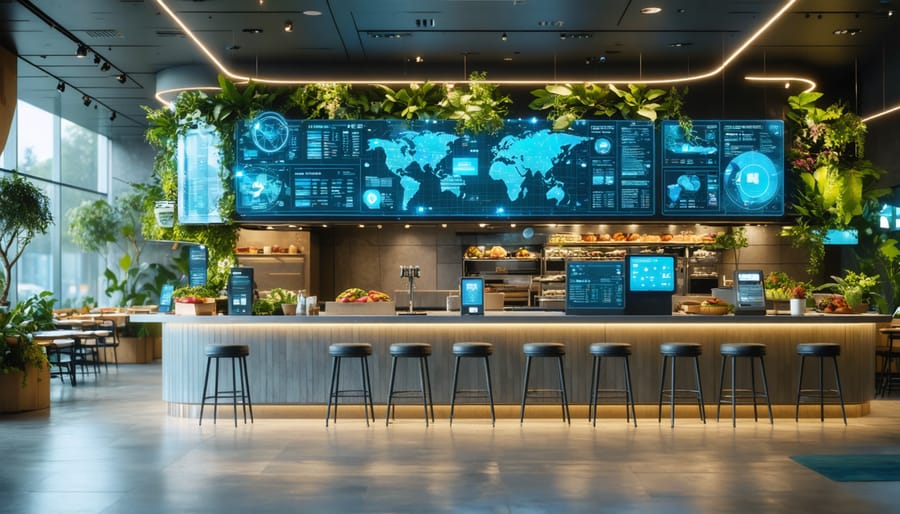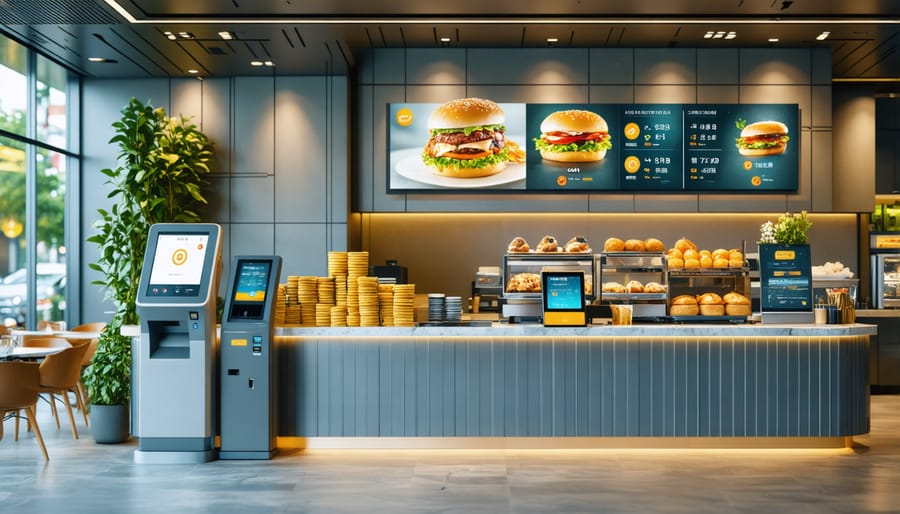
In a groundbreaking gathering of culinary innovators and business visionaries, the 2024 Restaurant Franchising and Innovation Summit promises to reshape the landscape of modern dining enterprises. As the restaurant industry continues to evolve at an unprecedented pace, launching a successful franchise requires more than just traditional business acumen – it demands a perfect blend of technological innovation, consumer insight, and adaptable business models.
This year’s summit brings together over 200 industry leaders, pioneering franchisors, and emerging restaurant tech companies to explore revolutionary approaches to food service, digital integration, and sustainable growth strategies. From ghost kitchens to AI-powered customer service solutions, attendees will discover how cutting-edge innovations are transforming traditional franchising models into agile, future-ready operations.
Whether you’re an established franchisor looking to expand your portfolio or an ambitious entrepreneur seeking to enter the restaurant franchise market, this summit offers unparalleled networking opportunities and actionable insights that could define your next decade in the industry. Join us as we explore how creativity meets profitability in the ever-evolving world of restaurant franchising.
Modern Franchise Innovation Trends
Digital Integration Success Stories
The digital transformation success stories from this year’s summit showcased how embracing technology can revolutionize franchise restaurant operations in remarkable ways. Take Sarah’s story, for instance. Her pizza franchise chain saw a 40% increase in delivery orders after implementing an AI-powered ordering system that remembers customer preferences and suggests personalized menu items.
Another inspiring example came from the Martinez family’s taco franchise. They introduced a mobile loyalty app that gamified the dining experience, rewarding customers with points and exclusive offers. Within six months, their customer retention rate jumped by 35%, and social media engagement doubled.
The summit’s standout success story was Jennifer’s farm-to-table franchise network. By implementing blockchain technology to track ingredient sourcing, they not only improved supply chain efficiency but also built incredible customer trust. Their digital transformation journey included QR codes on menus that let diners explore the journey of their meals from farm to plate.
What made these stories particularly compelling was how they balanced technology with the human touch. Each franchise maintained its unique personality while leveraging digital tools to enhance customer experience and operational efficiency. Their success proves that when implemented thoughtfully, digital innovation can create meaningful connections with customers while boosting the bottom line.

Sustainable Practices That Boost Profits
As someone who’s attended countless restaurant innovation summits, I’ve noticed a remarkable shift in how sustainability is becoming a profit driver rather than just a feel-good initiative. Today’s franchise owners are discovering that eco-friendly practices not only appeal to environmentally conscious customers but also significantly impact their bottom line.
Take Sarah, a franchise owner I met last month, who reduced her restaurant’s energy costs by 40% after implementing LED lighting and energy-efficient appliances. Her initial investment paid for itself within eight months, and now those savings go straight to her profit margin. It’s these kinds of smart, sustainable choices that are transforming the industry.
Many franchises are finding success with waste reduction programs. By implementing detailed food waste tracking systems and composting programs, restaurants are cutting disposal costs while creating valuable marketing opportunities. Some franchises have reported savings of up to $5,000 monthly just by better managing their waste streams.
Local sourcing has emerged as another profitable sustainable practice. While it might seem counterintuitive to smaller franchises, building relationships with local suppliers often leads to better pricing, fresher ingredients, and stronger community connections. Plus, customers are increasingly willing to pay premium prices for locally-sourced meals.
Water conservation initiatives, from low-flow faucets to water-efficient dishwashers, are proving to be another area where sustainability meets profitability. These solutions require minimal upfront investment but deliver consistent long-term savings that benefit both the environment and the restaurant’s financial health.
Customer Experience Revolution
Personalization Strategies
Picture walking into your favorite chain restaurant, where the staff greets you by name and already knows your preferred booth by the window. That’s the magic of personalization in modern franchising, and it’s transforming how brands connect with their customers while maintaining their signature experience.
During the summit, industry leaders shared inspiring examples of how they’re striking this delicate balance. One franchise owner shared how she implemented a digital loyalty program that remembers customers’ birthdays and favorite dishes, creating those “wow” moments that keep people coming back. Another discussed using local ingredients in signature dishes, allowing each location to add a hometown twist while staying true to the core menu.
Technology plays a crucial role in this personalized approach. Mobile apps now learn customer preferences over time, suggesting menu items based on past orders and dietary restrictions. Some franchises are even experimenting with AI-powered menu boards that adjust recommendations based on time of day, weather, and local events.
The key takeaway? Successful personalization isn’t about reinventing the wheel – it’s about adding thoughtful touches that make each customer feel special while preserving the consistency that made the brand successful in the first place. As one speaker beautifully put it, “Think of it as adding local spices to a beloved family recipe – the essence stays the same, but the experience becomes uniquely memorable.”

Social Media Integration
In today’s digital-first world, social media has become the heartbeat of customer engagement for successful restaurant franchises. During the summit, industry leaders shared how platforms like Instagram, TikTok, and Facebook are revolutionizing the way franchises connect with their customers and build brand loyalty.
One particularly inspiring case study came from Sarah Chen, whose franchise group saw a 40% increase in foot traffic after implementing a coordinated social media strategy across their locations. “It’s not just about posting pretty food pictures anymore,” she explained. “It’s about creating an experience that extends from the screen to the table.”
The summit highlighted several key strategies for effective social media integration:
– Encouraging franchisees to share local stories and community involvement
– Creating shareable moments in-store with Instagram-worthy presentation
– Developing location-specific hashtag campaigns
– Engaging with customer reviews and feedback in real-time
– Utilizing user-generated content to build authenticity
Many franchises are now incorporating social media training into their standard onboarding processes. “We’ve seen tremendous success with our ‘Digital Ambassador’ program,” shared Michael Rodriguez, whose franchise network leverages staff members’ social media expertise to create authentic, engaging content.
The key takeaway? Social media isn’t just a marketing tool – it’s an essential component of the modern franchise experience, helping build communities around your brand while providing valuable customer insights and engagement opportunities.
Future-Ready Franchise Models
Hybrid Service Models
Gone are the days when restaurants had to choose between being exclusively dine-in or takeout establishments. At this year’s summit, industry leaders shared fascinating insights into how combining multiple service models is becoming the secret sauce for success in modern franchising.
I recently visited a trendy franchise that perfectly exemplifies this hybrid approach. Picture this: a welcoming dining area with comfortable seating for traditional guests, alongside a dedicated space for takeout orders and a tech-enabled pickup station for delivery drivers. It’s like watching a carefully choreographed dance, with each service stream flowing smoothly without disrupting the others.
The most successful franchises are now implementing what I call the “triple-threat” approach: traditional table service, efficient takeout operations, and seamless digital ordering platforms. This flexibility isn’t just about maximizing revenue streams – it’s about meeting customers exactly where they are, whether they’re craving a sit-down experience with friends or preferring to enjoy their favorite dishes at home.
What’s particularly exciting is how technology is making these hybrid models more manageable. From smart kitchen display systems that prioritize orders based on service type to integrated apps that handle everything from reservations to loyalty rewards, the tools available to franchise owners have never been more sophisticated or user-friendly.
Remember, the key to success isn’t just offering multiple service options – it’s about maintaining consistent quality and brand experience across all channels.

Training and Development Evolution
Gone are the days of dusty training manuals and tedious orientation sessions. Today’s restaurant franchises are embracing modern training solutions that not only engage employees but also foster long-term career growth. I recently visited a franchise location where staff members were using VR headsets to practice complex cooking techniques – talk about a game-changer!
The evolution of training methods now includes mobile learning apps, gamified platforms, and personalized development tracks. These innovative approaches are particularly effective for the younger workforce, who appreciate the blend of technology and hands-on experience. One franchise owner shared with me how implementing a digital mentorship program reduced their staff turnover by 40% in just six months.
What’s truly exciting is how these new training methods create clear career pathways within the franchise system. From interactive microlearning modules to real-time performance tracking, employees can now visualize their growth journey and take ownership of their development. Many franchises are also incorporating social learning elements, where team members can share experiences and best practices through dedicated apps and platforms.
The focus has shifted from simple task training to holistic professional development, ensuring that each team member sees their role as a stepping stone to greater opportunities within the franchise network.
Technology Integration Roadmap
Technology integration in modern franchising isn’t just about following trends – it’s about creating seamless experiences that benefit both your team and customers. As someone who’s helped countless franchisees adapt to new technologies, I’ve seen firsthand how the right tech stack can make all the difference in building a franchise empire.
Start by implementing a cloud-based POS system that integrates with your inventory management and customer relationship tools. This foundation allows you to track sales patterns, manage stock levels, and understand customer preferences across all locations. Many of our successful franchisees begin with this essential step before expanding their tech footprint.
Next, consider mobile ordering and payment solutions. Today’s customers expect convenience, and offering a user-friendly app or mobile ordering system can significantly boost sales. One franchise owner I worked with saw a 40% increase in average order value after launching their mobile app!
Don’t forget about back-of-house operations. Smart kitchen display systems and automated inventory tracking can reduce waste and improve efficiency. Consider implementing AI-powered scheduling tools to optimize staff allocation based on peak hours and seasonal patterns.
Remember to phase these changes gradually. Start with pilot locations, gather feedback, and refine processes before rolling out across your franchise network. The key is finding the sweet spot between innovation and practical implementation that works for your unique business model.
As we wrap up our journey through the exciting world of restaurant franchising innovation, it’s clear that the industry is entering a transformative phase. The summit has highlighted how digital transformation, sustainability initiatives, and customer-centric approaches are no longer optional extras but essential ingredients for success in modern franchising.
From my conversations with fellow attendees, I’ve noticed a shared excitement about the possibilities ahead. The integration of AI-powered ordering systems and personalized customer experiences is revolutionizing how franchises operate, while sustainable practices are becoming a cornerstone of brand identity and customer loyalty.
Looking ahead, experts predict that successful franchise models will continue to embrace flexibility and adaptation. The future of restaurant franchising lies in creating seamless experiences that blend traditional hospitality with innovative technology. Whether it’s through ghost kitchens, automated service solutions, or enhanced delivery systems, the possibilities are endless.
For those considering entering the franchise world or current franchisees looking to innovate, the key takeaway is clear: stay agile, embrace change, and keep your customers at the heart of every decision. The most successful franchises will be those that can maintain their core identity while adapting to evolving consumer needs and technological advances.
Remember, innovation isn’t just about implementing new technology – it’s about creating meaningful experiences that resonate with your community while building a sustainable, profitable business model. The future of restaurant franchising is bright, and I’m excited to see how these innovations will shape our dining experiences in the years to come.



